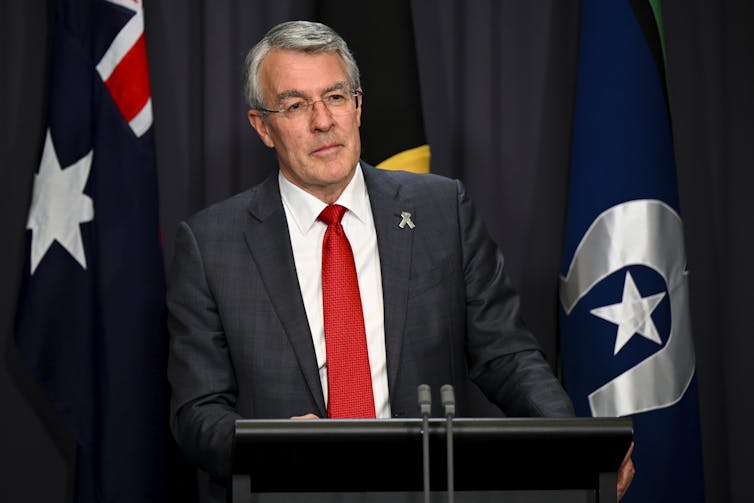
There is a lot to be energized about in Legal professional-Common Mark Dreyfus’s draft Relatives Law Amendment Bill 2023, the first in a projected series of reforms that promise to place children’s desires and interests back at the centre of family regulation.
But the proposed reforms cease quick of the radical alter that is needed.
To improve the tradition of the courtroom, little ones have to have lawful legal rights – not just a rubbery set of “best interests”. And the courtroom have to be dependable for making certain children’s rights are safeguarded.
A central dilemma is that the adversarial lifestyle of the court marginalises small children, and can profoundly silence them, including when young children categorical fears about their protection.
On the upside, the proposed laws will demand the Federal Circuit and Relatives Court docket, and Spouse and children Court docket of Western Australia, to additional sufficiently prioritise children’s basic safety problems than it has completed in the past.
Examine far more:
Reserve extract: ‘Broken’ — requiem for the spouse and children courtroom
Ending the presumption of ‘shared parental responsibility’
It abandons the presumption of “shared parental responsibility”, which has been broadly misunderstood to indicate shared treatment. This may perhaps be an achievable goal for family members that do not require to go to court docket to make safe and sound arrangements for their children’s care, but is unsuitable if not risky for households with the sophisticated demands and hazard components that come before the court docket. This contains domestic abuse and family members violence, youngster sexual abuse, drug and alcoholic beverages addiction, and really serious mental wellness problems.
In its place, the monthly bill proposes that the child should be at the centre of each and every lawful resolve.
Noticeably, the child’s views will be supplied larger prominence in the laws, alternatively than remaining dealt with as optional extras.
Impartial children’s lawyers – whose function is to make sure evidence relevant to the child’s “best interests” is place prior to the courtroom – will also find it more challenging to circumvent the prerequisite to in fact talk to the youngsters whose “best interests” they are meant to stand for.

Cassiano Psomas/Unsplash
Offering young children a voice
The fact that children’s security and views have not been the guiding concepts in family law for nearly two many years ought to be a issue of community shame.
In 2023, Australian small children have much less rights under the Loved ones Regulation Act than they did in 1975, when it was 1st enacted by the Whitlam authorities.
This devaluing of children’s rights has contributed to the courts’ failure to sufficiently recognise the autonomy of more mature small children. This contains the ideal of young persons to make age-suitable choices about their life, these types of as what subjects they will research, in which they will live, and who they will see.
In some instances, young people today have been subjected to unnecessarily traumatic and expensive litigation. One these kinds of example is a demo – the next of two last hearings – that sought to establish irrespective of whether a younger male a handful of months shy of 18 was permitted to settle for a hockey scholarship.
The hazards that show up at extremely adversarial relatives courtroom proceedings have been lifted in proof in successive inquests into baby deaths, this sort of as the murders of Jack and Jennifer Edwards by their father, the murders of Jane and Jessica Cuzens by their mother, and the murders of Darcey Freeman, Eeva Dorendahl, Jessica and Patrick Dalton, and Luke Batty, by their fathers.
Beneath courtroom orders, small children are routinely forced against their will into supervised (and unsupervised) contact arrangements with alleged perpetrators of domestic violence and baby sexual abuse – including cases in which abuse has been considered most likely, probable, or even proven.
The court docket really should not be exempt from obligations below the Countrywide Concepts for Baby Risk-free Organisations, an end result of the Royal Fee into Institutional Responses to Little one Sexual Abuse. It should really also be required to conform to Australia’s human legal rights obligations, as a signatory to the UN Conference on the Legal rights of the Little one.
Study additional:
Are you and your lover pondering of separating? Here is how to safeguard the kids’ mental health and fitness
The proposed variations
The draft Relatives Legislation Amendment Monthly bill offers outcome to essential tips in the Australian Legislation Reform Commission’s 2019 evaluation of the spouse and children regulation program. These changes had been shamefully stalled by the former Morrison federal government.
The proposed legislation will have to have loved ones report writers and Chapter 15 industry experts – who tender evidence and offer expert services to the court docket – to at lengthy last be regulated for criteria and top quality.
The court’s failure to adequately control these requirements has led to evident injustices, this sort of as the notorious case in which an accused paedophile was applied as a court docket pro to offer information on allegations of boy or girl sexual abuse.

Lukas Coch/AAP
The bill can make some attempt to deal with litigation abuse, a greatly documented phenomenon in which a perpetrator seeks to weaponise the authorized process – at times launching various steps across a assortment of lawful jurisdictions – in buy to intimidate, harm, inflict money hurt, threaten and harass a victim. The courtroom will be presented more electrical power to toss out these cases than it has at present.
There are also adjustments developed to far better protect sensitive info, to safeguard towards conditions in which perpetrators use subpoenas to get obtain to a victim’s healthcare or therapeutic data in buy to inflict harm.
Lots of elements of the monthly bill seek out to explain current arrangements, this sort of as placing out the situation in which a parenting get can be improved.
This may perhaps have some impression on litigation abuse, but it is not likely to help victims who have agreed to unsafe children’s preparations out of dread, or a absence of monetary methods. It also does not support, for illustration, a self-represented litigant whose English-language competencies are not at the degree that a quickly-paced adversarial lawful motion demands.
A latest report commissioned from Australian Institute of Household Reports demonstrates that contraventions of courtroom orders typically manifest because young children and young folks are not specified age-appropriate opportunities to participate in choice-making that directly affects their life. The report also observed a major amount of young children topic to court orders are dwelling in unsafe arrangements.
Reining in all those who profit
One more obtrusive omission is the want to much more strongly regulate the actions of the personal legal profession, like obscene profiteering.
The monthly bill addresses some unintended repercussions of privacy provisions contained in the act. But it does not enable grown ups whose mother and father went to court docket when they were little ones to overtly talk about the approaches in which the court’s choices impacted their lives.
Privacy provision ought to not be utilised to conceal injustice or silence victims.
Small children do not out of the blue remodel from dependence to autonomy on reaching the age 18. It is by building age-appropriate selections about their life that young folks work out how to stay and – in the long run – what sort of citizen they would like to be.
In 1975, the Whitlam governing administration approved that a younger individual at 14 had a correct to actively make decisions about their life, except there have been compelling reasons for a court to intervene.
It is time to go back to the long run – and put children’s safety and rights at the centre of family law.
Camilla Nelson is co-writer of Damaged: Small children, Mothers and fathers and Relatives Courts, Black Inc/La Trobe University Press.







